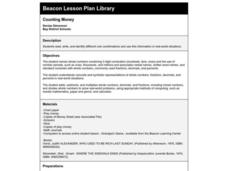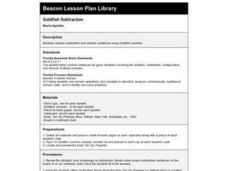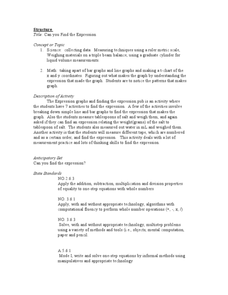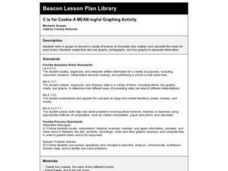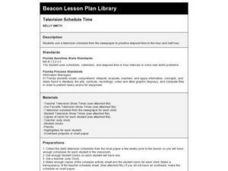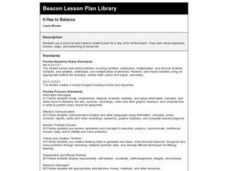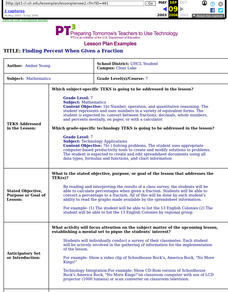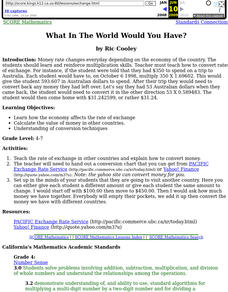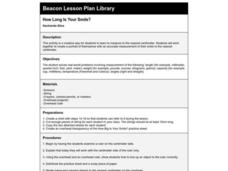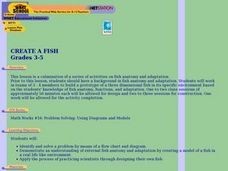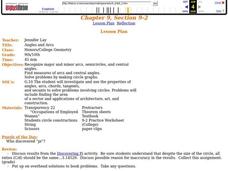Curated OER
Dance Decisions
In this making decisions learning exercise, 5th graders look over two charts/tables involving dance decisions and answer six mathematical questions relating to the charts/tables.
Curated OER
Counting Money
Students read, write, and identify different coin combinations and use this information in real-world situations.
Curated OER
The Ice Cream Shop
Second graders read books about ice cream and plan an ice cream sundae party for the class. They research ingredients and determine how much the party cost each student. They hold a mock opening for an ice cream store and have their party.
Curated OER
The Average Atom - Isotopes
Seventh graders, in groups, complete an Isotopes model and notice that atomic masses are decimal numbers. These masses are an average of all the isotopes of that element.
Curated OER
Goldfish Subtraction
Students manipulate Goldfish crackers to explore subtraction and number sentences.
Curated OER
The Price Is Right - Grocery Store Prices
Eighth graders use the unit price to compare which local grocery store has the best prices. Assign students to work with a partner and a role. One person is the recorder and the other is the mathematician.
Curated OER
Can you Find the Expression
Students collect data from measurements and weights for this experiment. In this algebra lesson, students analyze graphs they create form their data to find the expression representing the data. They label which graph provided the best...
Curated OER
Compare and Arrange Whole Numbers Up to 100
Number whizzes investigate integers by arranging them in a specific order. They utilize whole numbers which are given to them and then put them in order up to 100. They also practice using "greater than" or "lesser than" symbols.
Curated OER
U Boat Hunt
Students recognize patterns and sequences in numbers. In this geometry lesson, students create rules to define the sequences and patterns they obsere. They translate coded messages as they dicuss navigational terms.
Curated OER
C is for Cookie-A MEAN-ingful Graphing Activity
Third graders, in groups, dissect a variety of brands of chocolate chip cookies and calculate the mean for each brand. They create their own bar graphs, pictographs, and line graphs to represent information.
Curated OER
Television Schedule Time
Students consider the concept of elapsed time by examining television schedules. They list five television shows and highlight them in a newspaper, marking down the beginning and ending time of each show. They use clocks to figure out...
Curated OER
Let's Cook
Students practice converting measurements into metrics. In groups, they translate a recipe from English into German and convert all measurements into metrics for the recipe. They examine the difference between United States and metric...
Curated OER
Too Many Tens
Young scholars practice grouping in different ways by putting numbers up to 1,000 in the correct place value. In this place value lesson plan, students estimate items in a jar and then count them out by grouping them by 10s.
Curated OER
It Has to Balance
Second graders use a price list and balance sheet to plan for a day of fun at the beach. They consider expenses, income, and balancing of resources.
Curated OER
Finding Percent When Given A Fraction
Seventh graders calculate percentages when given a fraction. They convert a percentage to a fraction. All of this be done by each student's ability to read the graphs made available by the spreadsheet information.
Curated OER
Perimeter and Area
Fifth graders identify the area and perimeter of a rectangle. In this perimeter lesson, 5th graders use geoboards and rubber bands to construct various rectangles. Students use the formula to calculate area and perimeter of the...
Curated OER
Sextant Measurements
Students create a sextant. Using their sextant, students measure the height of tall objects. Students explore how sailors used sextants to identify their location on the ocean. They research how sextants are created.
Curated OER
Finding Sums to 6
Students explore the additive identity property where they add multiple numbers to get to the number 6. In this number 6 lesson plan, students also work on their addition charts.
Curated OER
What In The World Would You Have?
Pupils calculate value of money in other countries, and explore how the economy affects the rate of exchange.
Curated OER
What are the Chances: A Game of Chance!
Sixth graders experiment with dice, playing cards, pennies and computer-generated simulations to calculate probability. They use compiled data to make predictions.
Curated OER
How Long Is Your Smile?
Fourth graders measure to the nearest centimeter. They work together to create a portrait of themselves with an accurate measurement of their smile to the nearest centimeter. This is a creative way for students to explore centimeters.
Curated OER
CREATE A FISH
Young scholars watch a video that helps shows them how a diagram, flow chart, or blueprint can help them create a 3-d fish with the correct anatomy to live in a realistic environment.
Curated OER
Angles and Arcs
Students discuss the sum of central angles and use string to create them on circles. They find the measure and length of both minor and major arcs.
Students give examples of concentric, similar, and congruent circles and congruent arcs.



